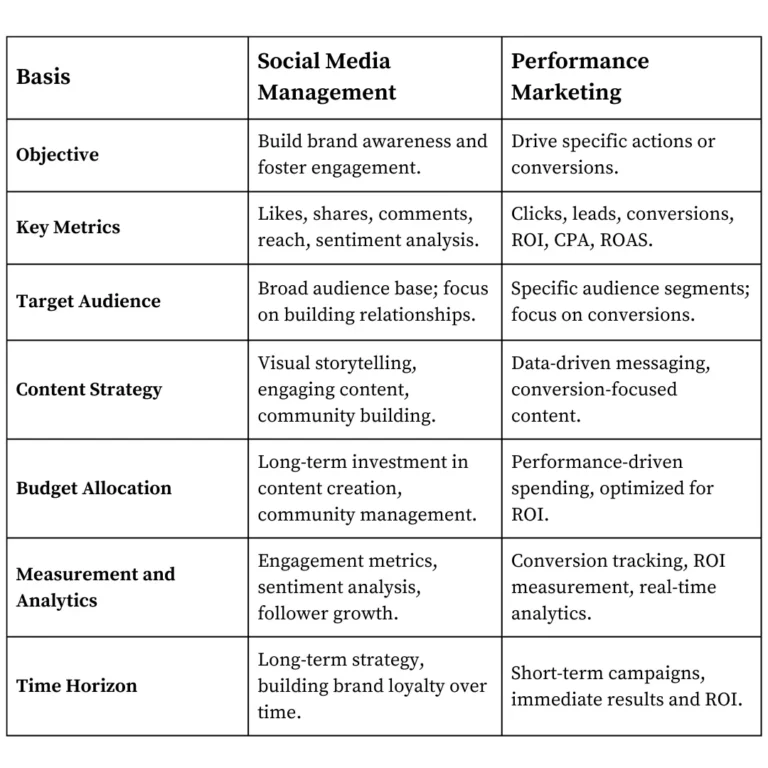

The Ultimate Showdown: Social Media Management vs Performance Marketing – Which Wins?
In today’s digital landscape, businesses face a myriad of options when it comes to marketing strategies. Two popular approaches that often vie for attention are social media management and performance marketing. While both aim to achieve marketing goals, they differ in their methodologies, objectives, and target outcomes. In this comprehensive guide, we’ll delve into the nuances of social media management and performance marketing, exploring their definitions, components, advantages, and how they can be integrated for optimal results.
Table of Contents
ToggleUnderstanding Social Media Management
Social media management encompasses the strategic planning, implementation, and monitoring of a brand’s presence on social media platforms. Its primary objectives include building brand awareness, fostering engagement with the audience, and nurturing relationships with customers. To achieve these goals, social media managers employ various tactics such as content creation, community engagement, and reputation management.
In today’s digital age, where consumers spend a significant amount of time online, social media management plays a crucial role in shaping brand perception, engaging with the target audience, and driving business objectives.
One of the core objectives of social media management is to build and maintain brand awareness. By establishing a consistent and recognizable presence on platforms like Facebook, Instagram, Twitter, LinkedIn, and others, businesses can ensure that their brand remains top-of-mind among their target audience. This involves creating a cohesive brand identity, including visual elements such as logos, colours, and graphics, as well as a consistent tone of voice in messaging.
In addition to brand awareness, social media management aims to foster meaningful engagement with the audience. This involves not only broadcasting messages but also actively participating in conversations, responding to comments and messages, and fostering a sense of community around the brand. By engaging with their audience in a genuine and authentic manner, businesses can build trust and loyalty, ultimately leading to increased customer retention and advocacy.
Central to effective social media management is the creation and distribution of compelling content that resonates with the target audience. This content can take various forms, including blog posts, articles, videos, infographics, and more, depending on the preferences of the audience and the nature of the brand. Social media managers are tasked with developing a content strategy that aligns with the brand’s objectives, resonates with the target audience, and drives engagement and interactions.
Community management is another key aspect of social media management, involving the proactive management of online communities and conversations around the brand. This includes monitoring social media channels for mentions, comments, and messages, as well as actively engaging with followers and addressing any issues or concerns in a timely manner. By fostering a positive and supportive community, businesses can enhance brand loyalty and advocacy among their audience.
Moreover, social media management encompasses reputation management, which involves monitoring and managing the brand’s online reputation across various social media channels. This includes addressing any negative feedback or reviews in a constructive manner, as well as leveraging positive feedback to reinforce the brand’s image and values.
Delving into Performance Marketing
Performance marketing, on the other hand, is a data-driven approach focused on achieving specific, measurable actions or conversions. Unlike traditional marketing, which may prioritize brand visibility or awareness, performance marketing is highly targeted and results-oriented. Key components of performance marketing campaigns include precise audience targeting, conversion tracking, and optimization based on real-time analytics.
At its core, performance marketing is characterized by its emphasis on measurable outcomes and return on investment (ROI). This means that every marketing activity is meticulously tracked, analyzed, and optimized to ensure maximum efficiency and effectiveness. By leveraging data-driven insights and analytics, businesses can identify which marketing channels, tactics, and messages are most successful in driving desired actions, allowing for continuous refinement and improvement of marketing strategies.
Key components of a performance marketing campaign include precise audience targeting, conversion tracking, and optimization based on real-time analytics.
Audience targeting involves identifying and segmenting the most relevant audience segments based on factors such as demographics, interests, behaviour, and purchasing intent. This allows businesses to tailor their marketing messages and offers to resonate with specific audience segments, increasing the likelihood of conversion.
Conversion tracking is another essential aspect of performance marketing, enabling businesses to monitor and measure the actions taken by users in response to marketing efforts. This may include tracking website visits, form submissions, purchases, or other desired actions, depending on the campaign objectives. By accurately tracking conversions, businesses can assess the effectiveness of their marketing campaigns and make data-driven decisions to optimize performance.
Optimization is a continuous process in performance marketing, involving the analysis of campaign performance data to identify areas for improvement and refinement. This may include adjusting targeting parameters, optimizing ad creative and messaging, testing different ad formats or placements, and refining landing pages or conversion funnels. By iteratively testing and optimizing campaign elements, businesses can maximize their ROI and achieve better results over time.
One of the key advantages of performance marketing is its accountability and transparency. Unlike traditional forms of advertising where success metrics may be subjective or difficult to measure, performance marketing provides clear and quantifiable results that directly tie back to business objectives. This allows businesses to allocate their marketing budgets more effectively, focusing on channels and tactics that deliver the highest return on investment.
In summary, performance marketing is a data-driven and results-oriented approach to marketing that focuses on driving specific actions or conversions. By leveraging precise audience targeting, conversion tracking, and continuous optimization, businesses can maximize their marketing ROI and achieve measurable results that directly impact their bottom line. Success in performance marketing requires a strategic approach, accurate data tracking, and a commitment to continuous improvement and innovation.
Here’s A Quick Summary

Contrasting Approaches: Social Media Management vs Performance Marketing
Objectives and KPIs
Social media management primarily aims to enhance brand visibility, foster community engagement, and cultivate relationships with the audience. Key performance indicators (KPIs) in social media management often include metrics such as likes, shares, comments, and brand sentiment. Performance marketing, on the other hand, is driven by specific actions or conversions, such as clicks, leads, sales, or other desired outcome.
Target Audience
In social media management, the focus is often on building a broad audience base and nurturing relationships with diverse segments of the audience. In contrast, performance marketing emphasizes targeting specific audience segments based on demographic, behavioural, or psychographic factors to maximize conversion rates and ROI.
Content Strategy
Social media management relies heavily on content creation and curation to engage the audience through visual storytelling, compelling narratives, and interactive experiences. Performance marketing, however, prioritizes data-driven messaging and optimization strategies to deliver targeted advertising messages that drive conversions.
Budget Allocation
Social media management typically involves long-term investment in content creation, community management, and brand-building activities. In contrast, performance marketing allows for flexible budget allocation based on performance metrics, with a focus on maximizing ROI through targeted advertising spend.
Synergistic Strategies: Integrating Social Media Management and Performance Marketing
To leverage the strengths of both approaches, businesses can integrate social media management and performance marketing strategies for a comprehensive marketing strategy. By aligning social media content with performance marketing objectives and leveraging performance marketing data to inform social media strategies, businesses can optimize their marketing efforts and achieve greater results.
Case Studies and Real-World Examples
To illustrate the effectiveness of integrating social media management and performance marketing, let’s examine two case studies:


Case Study 1:
Company A’s Social Media Management Approach
Company A, a lifestyle brand, focuses on building a strong presence on social media platforms to engage with its audience and showcase its products and services. Through consistent content creation, community engagement, and influencer partnerships, Company A has successfully cultivated a loyal following and increased brand awareness.
Case Study 2:
Company B’s Performance Marketing Campaign
Company B, an e-commerce retailer, employs performance marketing tactics to drive targeted traffic and conversions. By leveraging data analytics and optimization strategies, Company B optimizes its advertising campaigns to maximize ROI and drive sales.
Comparative Analysis of Results and Lessons Learned
While both approaches have their strengths and limitations, integrating social media management and performance marketing can yield synergistic benefits. By combining the engagement-focused strategies of social media management with the performance-driven tactics of performance marketing, businesses can create a holistic marketing strategy that effectively reaches and engages their target audience while driving measurable results.
Future of Digital Marketing: Trends and Predictions
As digital marketing continues to evolve, new technologies and platforms are shaping the landscape of social media management and performance marketing. Emerging trends such as AI-driven personalization, influencer marketing, and omnichannel marketing are likely to play a significant role in the future of digital marketing. To stay ahead of the curve, businesses must adapt to these trends and embrace innovative strategies that resonate with their target audience.
Frequently Asked Questions
Can social media management replace performance marketing?
While social media management is essential for building brand awareness and engaging with the audience, it does not directly replace performance marketing, which focuses on driving specific actions or conversions. Integrating both approaches can yield better results than relying solely on one.
How can businesses measure the success of their social media management and performance marketing efforts?
Businesses can measure the success of their social media management efforts through metrics such as engagement rate, reach, sentiment analysis, and follower growth. For performance marketing, key metrics include click-through rate (CTR), conversion rate, return on ad spend (ROAS), and cost per acquisition (CPA).
What are some best practices for integrating social media management and performance marketing?
Some best practices for integrating social media management and performance marketing include aligning content with performance goals, leveraging performance data to optimize social media strategies, and coordinating messaging and targeting across both channels. Additionally, testing and iterating on strategies based on performance data can help optimize results over time.
